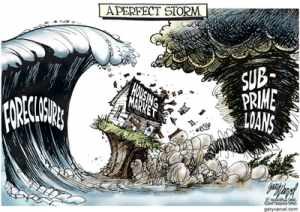In late September 2008, a major financial crisis emerged, causing a recession of paralleled magnitude to that of the great depression in the 1930’s, and the crash of the stock market. It was largely caused by a massive housing bubble built over time due to greed and ineffective organizational behaviour of banks and rating agencies. In short, as banks attempted to sell as many grouped mortgage bonds (called “CDO’s” or Collateralized Debt Obligations) as they possibly could, in order to collect commission, they eventually ran out of higher quality loans to group together. As a result, they started giving out subprime loans to fill up their CDO’s, which were extremely low quality and given to people with a high risk of defaulting (Kosakowski, 2017). For example, strippers would own two to three houses! Rating agencies wrongly still rated these lower quality CDO’s with AAA ratings, in fear that banks would take their business to other agencies if they refused to give them what they wanted. Eventually, as default rates on these subprime loans began to rise, these bonds failed, which created the crash. Although this is a simplified explanation, it still highlights the vastly flawed organizational behaviour of banks and rating agencies.
Stevan Noronha stated in his blog post about how he “lost everything in 2008,” that “it was a painful period for me; personally, as I had saved this capital for my business and was hoping the investments in stock would provide the cushion” (Noronha, 2013). I found this blog to be extremely helpful, as it provides a first person insight into the suffering that amassed as a result of the crash. Many other people also more dramatically lost their jobs and their homes, all due to simple and avoidable greed.
Due to the fact that bankers and employees at rating agencies were very extrinsically motivated, pertained to Theory X (people naturally dislike work), and likely withheld high pressure to perform from their superiors, they took shortcuts that had drastic implications. In hindsight, a proper solution to this issue would include the Lewin’s Model of unfreezing the current situation, altering the management style of the organizations to be held to a higher ethical standard, and refreezing with the change locked in place.
The effects of the 2008 recession are still felt today, and the underlying issue to the problem is widely applicable to the theories and models of organizational behaviour. In the future, these tools can be used to prevent such a substantial downfall of the economy from occurring again.
Bibliography (APA):
[A Perfect Storm: 2008 Financial Crisis]. (n.d.). Retrieved March 28, 2017, from https://seebetterlear.files.wordpress.com/2013/06/saupload_housing_crisis_cartoon.png
Kosakowski, P. (2017, March 13). The Fall Of The Market In The Fall Of 2008. Retrieved March 29, 2017, from http://www.investopedia.com/articles/economics/09/subprime-market-2008.asp
Noronha, S. (2013, October 27). How I lost everything in 2008 stock market crash – Three lessons learnt. Retrieved March 29, 2017, from http://www.stevannoronha.com/three-important-things-about-investing-the-2008-stock-market-crash-taught-me/
The Origins of the Financial Crisis – Crash Course. (2013, September 07). Retrieved March 29, 2017, from http://www.economist.com/news/schoolsbrief/21584534-effects-financial-crisis-are-still-being-felt-five-years-article
